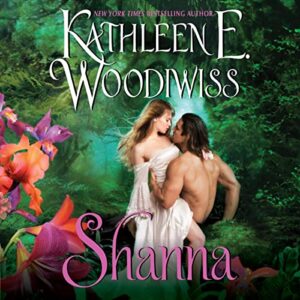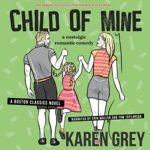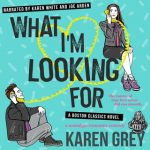Narrated by Robin Miles
I have a confession. Shanna is on my keeper shelf. First published in 1977, it was one of those novels I cut my romance-reading teeth on, before I knew much of anything about anything. It’s, obviously, “old skool” romance. But, as these books go, it has much less of the more egregious or objectionable content than others and is, while still problematic, it is at least far less so than others from this author or of the time period.
Harper has released Woodiwiss’s novels on audio with new recordings. Each has a (long) foreword which talks about how the book is of it’s time etc etc. I didn’t listen to it. I know the book already so I knew what I was getting into.
Shanna is also a long book – the kind of sweeping story you don’t get much these days (there are reasons for that – some good, some not so much IMO) – my paperback is 656 pages and the audiobook, complete, with foreword, tops out at nearly 30 hours.
Shanna Trahern is the young, beautiful and wilful daughter of Squire Orlan Trahern (who is Welsh but you wouldn’t know that from the narration – more on that later). Squire Trahern owns a small island “Los Camellos” somewhere not terribly far from England. It takes about a week to sail there in an old-timey ship but it’s tropical. That’s what I know. He’s a wealthy and widowed merchant with a longing for grandchildren and so he’s very keen for Shanna to marry. Unfortunately for him, Shanna is picky and he eventually gives her an ultimatum: find someone she wants to marry within a year or he will do the picking for her. Shanna is not having it. She has found no-one suitable and so comes up with a scheme to flout her father’s will. There is a condemned prisoner in Newgate with the impressive surname of Beauchamp (pronounced “Beacham”; something I only know because of Outlander – English is stupid) but due to hang within the week. She offers a bargain to Ruark Deverell Beauchamp, a colonial from Virginia: in return for his name, she will make his final days easier. Ruark, makes his own amendment to the deal. He will marry Shanna, but he wants a true wedding night. She agrees.
The only dubious consent (between the love interests at least) in Shanna arises from this bargain. Shanna makes the deal but plans to renege. Her plan was for the reneging to occur before any hanky panky in the carriage after the wedding, but she mistimes her “rescue”. As it happens, Ruark takes her virginity but is unable to, er, finish, let’s say. Ruark doesn’t exactly force Shanna to consummate the marriage – he is far more persuasive than that and she is not immune to his charms. Still she doesn’t exactly give enthusiastic consent either. I viewed it as a kind of sex work – the book certainly references it as a bargain struck. YMMV.
After that, the sex is all fully consensual. And, for a mainstream book from 1977 there is a lot of it. It’s not explicit – there is an abundance of euphemism and the prose is a little purple but Shanna and Ruark are boning down pretty regularly throughout the story. There’s probably something a bit revolutionary about that deserving of its own op-ed but I don’t have time for it here so I’ll move on.
Shanna, believing Ruark duly hanged, returns to Los Camellos and her father a “widow”. Squire Trahern thus thwarted must respect her bereavement.
Only, Ruark, due to the machinations of a greedy gaoler and a corrupt man of business, has escaped the hangman’s noose and has instead been sold as a “bondslave” (a kind of indentured servitude) to none other than the squire himself.
It does not appear that Squire Trahern is a slave owner in the sense of the African slave trade. He does buy “bondslaves” by paying their debt following an auction and then, in return for their labour, paying them a wage and keeping some of it until the debt is repaid. The squire’s bondsmen are, from what I could tell, fairly well looked after, have autonomy in many ways and are not locked up (at least not once on Los Camellos) or restricted in a cell or anything like that. They can’t leave the island until their debt is paid but they have the run of the place. They are provided with clothing and a wage which I gathered was fair for the time (?) and they are given the ability to earn more if their work is good.
(Ruark is a very good worker and he quickly gets a number of pay rises. It doesn’t take long for Ruark to become the squire’s right-hand man when it comes to farming, and he is often found at the squire’s table for breakfast or dinner. The squire doesn’t have any qualms about sharing his dinner table with Ruark and demands Shanna treat him as a guest when he is there.)
There is talk in the book of “slaves” but they are, for the most part, indentured labour who are not permanently enslaved – here is how Wikipedia differentiates the two: indentured servitude of Irish and other European peoples occurred in seventeenth-century Barbados, and was fundamentally different from enslavement: an enslaved African’s body was owned, as were the bodies of their children, while the labour of indentured servants was under contractual ownership of another person.
Indentured servitude is definitely not something I endorse but in the setting and the society of the time, I give the squire some points for not using enslaved people from Africa which was sadly common at the time for landowners growing sugar cane.
Later in the book, there is one reference to “slave quarters” at the family home of Beauchamps but there is no other reference to slave labour, so it seemed to me this was a reference, again, to indentured servitude. I’m a bit rubbery on this though as there is a dearth of information about this in the text.
There are certainly problematic things in Shanna. Indentured servitude is bad. Owning a person, even “temporarily to pay off a debt” is bad. There is no such thing as a “good slaveowner”.
There are people of colour in the book, some of them servants. They all appear to be free people, treated well, respected and valued.
There is some language in the book which is objectionable, particularly in one section where there is a reference to a biracial person of colour by use of a euphemism which is not okay (starts with “m”, ends with “o”).
There are also repeated references to Native American people as “s__ages”. For the most part this notion is strongly refuted so there’s that, but still.
What I’m saying is that this book is not going to be for everyone and that’s totally fair. Possibly my love for the book stems from when I first read it and the ignorance I had then. But I felt like this book held up reasonably well, all things considered.
Anywho, Ruark comes to Los Camellos and there is a constant reminder to Shanna of a “bargain fairly struck but unmet”. Ruark doesn’t press her exactly. He’s just there, reminding her of her promise and that’s enough. He’s also gorgeous and she remembers those pants-feelings he gave her and is curious about where they may all lead. He’s also clever and quick. He designs things that make the worker’s lives better and make more money for the squire. He does odd jobs for locals in his free time. He’s actually a good guy she comes to admire for himself apart from anything else. Had they met in a more traditional manner she probably would have fallen head over heels for him.
Shanna’s battle isn’t really against Ruark. It’s against herself. Shanna had the idea of marrying a nobleman. Ruark was a convicted criminal. He denies powerful relations. He is currently a bondsman. That is not the ideal husband Shanna had in mind. Even after Shanna gives into her physical desires, she holds herself apart from him emotionally. It takes her an eon (well, about a year but it‘s a really long book!) to get with the program and admit her love. Ruark, for his part, loves her almost from the first (that is one of the best parts of the book.)
There’s a capture by pirates, travel to Virginia and revelations about whether or not Ruark was fairly condemned to hang (spoiler: he wasn’t) and who the bad guys are, revelations about connections between other cast members in the story, revelations to the squire about Shanna and Ruark’s true relationship (Orlan has no idea and it’s a messy story that starts in a gaol so that’s not a conversation Shanna has been looking forward to at all). And there’s a HEA. Of course.
The language is of its time, a little on the flowery side. Possibly I’d struggle to read it for the first time now, but the nostalgia is powerful and it brought back fond memories of the first time I read the book.
I had heard excellent things about Robin Miles and I had high hopes for the narration. I was disappointed. The narrative and her voice for Shanna were the best parts of it. She certainly had good pacing and delivered with expression and emotion. But there were many many accents required for this book and most all of the others were terrible.
Shanna was “shah-na” or “shan-a” (rhymes with manna) interchangeably for a while before settling on the latter (yay – that’s how I think it should be said). Ruark’s accent changed too – although to be fair, one of those changes was textual – he “affected an Irish brogue” for the squire when they first met. The Irish brogue was terrible though and it disappeared later without a trace. If the squire thought anything of it, it was never mentioned.
Ms. Miles is good at posh English accents. I’ll give her that.
Whatever accent she gave to Squire Trahern was like nothing I’d heard before – and not in a good way. It was certainly nothing approaching Welsh. It’s difficult to describe other than to say it wasn’t good. Squire Trahern is a large part of the book so it was impossible for me to get past it.
Hergus, Shanna’s maid, had a Scottish accent which was okay sometimes and very much not other times. Berthe, the housekeeper was Dutch but the accent given to her did not sound so to me. There were others.
The bad accents got in the way of my enjoyment of the listen. I admit I turned to my paperback for some of it and skipped ahead.
Ruark’s voice was okay sometimes and I got used to it. Shanna’s tone was a little older than her years, but I could get past that. What Shanna needed was a Davina Porter (sadly, retired, but all the best to her) or a Nicholas Boulton.
For those who want to revisit the story or try it for the first time, I’d recommend the paperback or ebook over the audio, sadly.
Kaetrin
Buy Shanna by Kathleen E. Woodiwiss on Amazon





I laughed out loud a few times reading this, and shared parts with my husband, who also got a kick out of it, especially the squire not mentioning the accent change. :-D I’ve never read the book, and probably won’t, but I thank you for a very entertaining and well written review. Well done!
Thank you. I didn’t realise it would be funny so bonus!
I didn’t start reading romance/HR in a big way until the early 2000s, so I missed out on the bodice ripper sagas of the 70s and 80s and just haven’t got around to reading more than a couple of them (Whitney My Love and … something else that was clearly memorable as I can’t remember the title!) I’m not sure I’d have the patience for one now.
Thanks for an entertaining review :)
I started reading romance in the 1980s when ye old bodice rippers were all the rage. I cut my romance reading teeth on rapetastic old skool romance (while not really understanding what I really was reading – in my defence, I was in my early teens). Some of them hold up remarkably well. Others, not so much. And, of course, I have problematic faves (but who doesn’t?). My other favourite of Woodiwiss’s is A Rose in Winter (it’s a kind of Beauty and the Beast story) – I don’t recall it being rapey either so yay – but I’m not a fan of the narrator used for the audiobook so I don’t see myself listening. You are though so I’d recommend it.
I did read romance back in my teens – Heyer and the odd Mills and Boon (I vaguely remember reading some Betty Neels). But I don’t recall seeing a lot old-skool books in shops, so I wonder if they were actually available here. It’s only really since the advent of Amazon that romances have been easy to get hold of; I remember buying Julia Quinn and Mary Balogh and others from the Zon because you couldn’t find them in shops, even the big ones.
Back then I was a big historical fiction reader and loved lit classics (Austen, Dickens, etc.)
I got my first romance novels from a box given to my mum by a friend. It was a treasure trove!
The old-skool bodice rippers were definitely available in UK in the late 1970s.
I read Heyer, Mills and Boon, Cartland etc earlier, either from the school library (only Heyer!) or paperbacks that me and my school friends bought and shared. I started teaching in the late 1970s and the newsagent near my bus stop had one of those revolving wire displays with Woodiwiss etc on. I can’t remember the names of the other authors, I just remember that many of the stories were set on boats. They were large format paperbacks (which I hadn’t seen before) and had very ‘Fabio’ covers! I even read the notorious ‘rape ointment’ one!!!!!!!!!!! I tried to reread Shanna a few years ago and couldn’t get through it.. I think The Wolf and the Dove was my favourite Woodiwiss but can’t remember why.